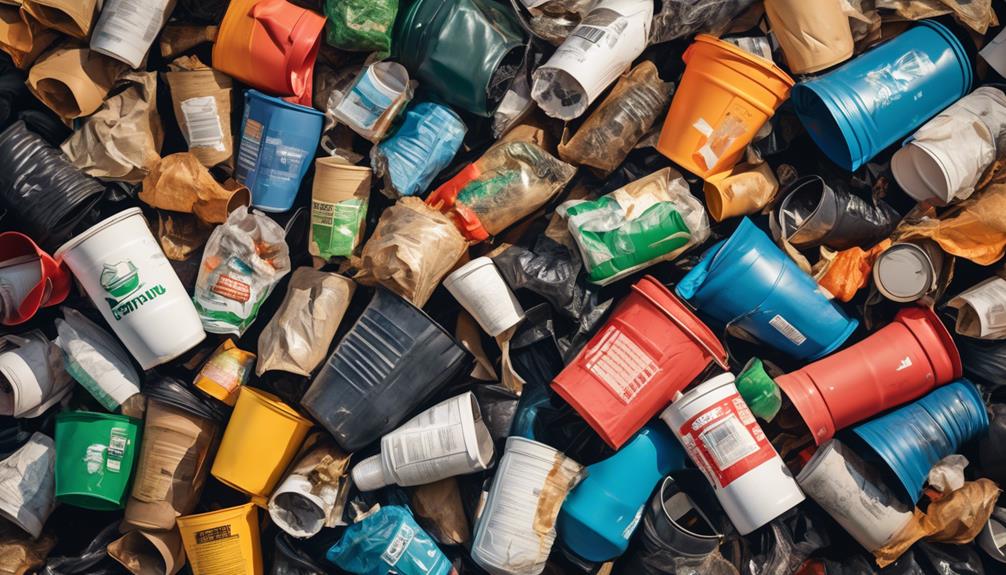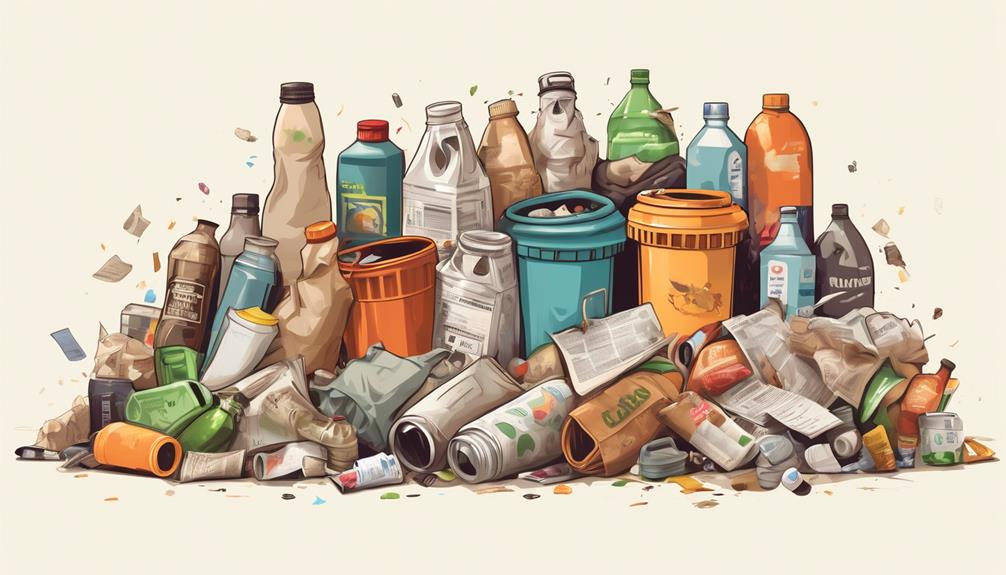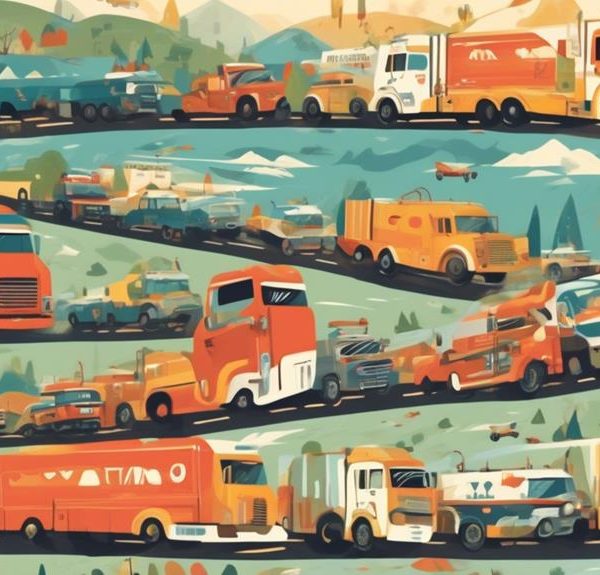Uncover the unexpected term for a group of trash and its importance in environmental consciousness and linguistic innovation.

Collective Noun for Trash
Did you know that there’s a specific term used to describe a group of trash? You might not have given it much thought, but just like a pride of lions or a school of fish, trash also has its own collective noun.
This might seem trivial or even amusing, but there’s a significant rationale behind it, linked to environmental awareness and linguistic creativity.
So, why does it matter and what could it possibly be? Let’s explore this less-known, yet intriguing aspect of our language and its connection to our everyday lives.
Key Takeaways
- Collective nouns represent a group or collection of people, animals, objects, or concepts as a single entity.
- Failing to identify a collective noun for trash can lead to awkward and unclear sentences.
- ‘Heap’, ‘pile’, ‘stack’, ‘load’, ‘batch’, and ‘landfill’ are commonly used collective nouns for trash.
- Unusual collective nouns like ‘flotsam’, ‘jumble’, ‘detritus’, and ‘midden’ add color and specificity to the subject of trash.
Understanding Collective Nouns

To comprehend collective nouns, you must first recognize them as a specific class of nouns that represent a group or collection of people, animals, objects, or concepts as a single entity. This unique aspect differentiates them from other categories of nouns. For instance, the term ‘army’ is a collective noun because it doesn’t just refer to one soldier, but a group of soldiers.
Similarly, when you’re dealing with waste management, you’re likely to encounter the collective noun for trash: ‘heap’. A heap isn’t just one piece of rubbish, but rather a collection or a pile. This isn’t just a grammatical curiosity, but a reflection of how language shapes and is shaped by our understanding of the world around us.
It’s important to understand this usage because it affects how we form sentences and convey meaning. Failing to identify a collective noun can lead to awkward, unclear sentences. For instance, saying ‘a heap are in the corner’ is incorrect; you’d say ‘a heap is in the corner’, treating the collective noun as a singular entity.
Thus, understanding collective nouns is crucial for efficient communication.
Origins of Trash Collective Nouns

Having grasped the concept of collective nouns and their application in the realm of waste management, let’s now explore the etymology and historical context of these terms, specifically focusing on ‘heap’, the collective noun for trash.
The term ‘heap’ originates from the Old English ‘heáp’, meaning ‘a pile, mound, or group’. It’s a word that’s been used since the 12th century to describe a collection or pile of objects, often irregularly arranged. In terms of trash, it’s easy to see how ‘heap’ became the collective noun of choice. Picture a mound of waste materials, and the term ‘heap’ seems quite fitting.
Interestingly, ‘heap’ also carries connotations of excess and abundance, derived from its use in describing large amounts of valuables or resources in ancient texts. This aspect of the term subtly reflects our society’s tendency towards overconsumption and waste generation.
Commonly Used Trash Collective Nouns

In examining the lexicon of waste management, you’ll find that ‘heap’ isn’t the only collective noun commonly used to refer to trash. ‘Pile’ is another term frequently employed, often conveying a sense of disorder or haphazard accumulation. In contrast, ‘stack’ suggests an intentional, orderly arrangement, albeit of items destined for disposal.
You’ll also encounter the term ‘load’, which typically refers to a quantity of waste that can be carried at one time, such as in a garbage truck. ‘Batch’ is another collective noun used, usually indicating a group of waste items processed or discarded together, often in the context of recycling or composting efforts.
On a larger scale, ‘landfill’ is a collective noun that denotes a site for disposal of waste materials by burial and is the oldest form of waste treatment. However, its usage also implies the environmental and societal issues associated with waste management, such as pollution and resource consumption.
In essence, these collective nouns for trash don’t merely categorize waste; they reflect our attitudes towards disposal, our management strategies, and the broader implications of our consumption habits. Their usage provides insight into the complex dynamics of our relationship with waste.
Unusual Trash Collective Nouns

While you’re likely familiar with the more common collective nouns for trash, there’s a whole host of unusual, even quirky, terms that you mightn’t have encountered before.
For instance, have you ever heard of a ‘flotsam’ of trash? Originating from maritime law, ‘flotsam’ refers to the wreckage of a ship or its cargo found floating on the water. Today, it’s used metaphorically for trash floating in the ocean or washed up on the shore.
Similarly, a ‘jumble’ of trash, though less common, is quite descriptive. It paints a picture of a disordered, mixed pile of waste. Then there’s ‘detritus,’ a term borrowed from geology, referring to loose material scattered about by erosion. In the context of trash, it’s used to describe waste or debris left behind over time.
Lastly, consider a ‘midden’ of trash. This term comes from archaeology and refers to prehistoric rubbish heaps. In our modern lexicon, it’s used to denote a pile of waste, particularly domestic waste.
These unusual collective nouns serve to enrich our language, adding color and specificity to the mundane subject of trash.
Importance of Trash Collective Nouns

Beyond the linguistic appeal, understanding these collective nouns for trash gains significance when we consider their implications on our perceptions of waste management and environmental sustainability.
You see, the language we use to talk about trash, like heaps, piles, or loads, frames our understanding of the issue. These terms imply vast, unmanageable quantities, subtly shaping our attitudes towards waste, often leading us to feel overwhelmed.
Furthermore, these collective nouns also play a role in highlighting the scale of the problem to the general public, policy makers, and corporate leaders. They’re not just whimsical linguistic quirks; they’re powerful tools for environmental advocacy.
Frequently Asked Questions
How Are New Collective Nouns for Trash Created and Accepted Into the English Language?
You’re curious about how new collective nouns make their way into English. It’s a fascinating process!
First, a term must be used consistently in spoken or written language. Over time, if it’s widely adopted, it may be recognized by linguistic authorities.
They’ll then include it in dictionaries and grammar guides, solidifying its place in the language.
It’s not a quick process, but it’s how language naturally evolves and grows.
Are There Any Regional Differences in the Use of Collective Nouns for Trash?
Yes, regional differences do exist in the usage of collective nouns. Depending on where you’re from, you might use different terms to describe a large amount of waste.
For instance, while some might use ‘heap’, others could say ‘pile’ or ‘mountain’. These variations often reflect local dialects, cultural nuances, and personal preferences.
It’s important to understand and respect these differences, as they enrich our language and communication.
Can Collective Nouns for Trash Be Used Interchangeably in Sentences?
Sure, you can interchange collective nouns for trash in your sentences. However, you need to keep in mind the context and cultural understanding of your audience.
For instance, ‘heap of rubbish’ might resonate more with a British audience, while ‘pile of trash’ could be more understood by Americans.
It’s all about ensuring clarity and understanding in your communication. So, while it’s possible, it’s also crucial to consider these factors.
How Can Learning Collective Nouns for Trash Enhance My English Vocabulary?
By mastering collective nouns for trash, you’re expanding your English vocabulary significantly. It gives you the capability to express yourself more accurately. You’ll be able to differentiate between a ‘pile’ or a ‘heap’ of garbage, for instance.
This nuanced understanding of language can improve your communication skills, making your speech and writing richer and more precise. It’s a small detail, but it can make a big impact on the clarity and sophistication of your language use.
What Are Some Examples of Collective Nouns for Trash in Other Languages?
You’re asking for examples of collective nouns for trash in other languages.
In Spanish, you’d use ‘basura’ for a pile of trash.
In French, ‘déchets’ refers to waste collectively.
In German, ‘Müll’ is used for garbage.
Each language has its unique way of expressing this concept, enriching your understanding of how different cultures perceive and categorize waste.
This can enhance your overall linguistic skills and cultural sensitivity.
Conclusion
In conclusion, understanding trash collective nouns is more than just a linguistic exercise. It’s a reflection of society’s relationship with waste and our efforts in managing it.
From the common ‘heap of trash’ to the unusual ‘flotilla of debris,’ these collective nouns not only enrich our language but also underscore the importance of waste management.
So, the next time you come across a ‘pile of garbage,’ remember, it’s not just trash, it’s a linguistic treasure.





Sign up